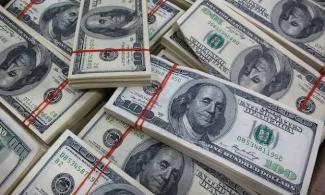
The apex bank noted that the money was bound for African countries.
Nigeria’s Central Bank Notifies Banks About Arrest Of Nigerian, 4 Foreigners Over $1Billion Counterfeit Money
The Central Bank of Nigeria (CBN) has alerted banks and other financial institutions of the arrest of a Nigerian and four others over their alleged involvement in currency counterfeiting amounting to $1 billion.
The apex bank noted that the money was bound for African countries.
The bank identified the arrested persons as Dele Bolade Samson Babaola, who holds both Nigerian and Swedish citizenship; Kean Kwasi Arhin from Ghana; Netanel Jacob Weiss from the United Kingdom; BO Nils Olof Forsanker and Peter Willi Herbert Schick – both from Sweden.
It disclosed this in an administrative letter to banks and Other Financial Institutions (OFIs), dated August 23, 2023, which was signed by the CBN Director, Financial Policy and Regulations Department, Chibuzo Efobi, THISDAY reports.
The bank, pursuant to Regulation 4 of the CBN Anti-Money Laundering, Combating the Financing of Terrorism and Countering Proliferation Financing of Weapons of Mass Destruction in Financial Institutions) Regulations, 2022, (CBN AML/CFT/CPF Regulations), directed financial institutions to conduct searches on their database to determine any information related to the identified individuals
It asked them to check if they have any accounts or hold any funds or economic resources for the persons involved while urging them to identify and file suspicious transaction reports to the Nigerian Financial Intelligence Unit (NFIU) and render NIL reports to the unit where no such records exist.
The CBN also directed the banks to comply with the directive immediately.
The central bank has stepped up its vigilance against money laundering activities to further protect the financial system.
On July 6, the CBN urged banks and other financial institutions (OFIs) to be vigilant and alert to possible emerging risks resulting from the circumvention of measures taken to protect the international financial system.
In July, SaharaReporters reported that the CBN had warned Deposit Money Banks and Other Financial Institutions in the country to increase monitoring of transactions with businesses and persons in and from Cameroon, Croatia and Vietnam.
It also reminded the financial institutions that the Russian Federation was still banned from the Financial Action Task Force (FATF).
Nigeria's apex bank gave the instructions in a circular with ref: FPR/AML/PUB/BOF/001/029, which was issued on Thursday by the Director of Financial Policy and Regulation, Mr Chibuzo Efobi.
It said the warning followed the Financial Action Task Force Plenary conducted from June 21-23, 2023, where Cameroon, Croatia and Vietnam were listed in a list of jurisdictions under ‘Increased Monitoring.’
CBN said that Nigerian banks and other financial institutions needed to be wary of transactions with those countries because they had been recently placed on a grey list by the Financial Action Task Force.
The Financial Action Task Force (FATF), a global money laundering and terrorist financing watchdog requires countries to implement 40 recommendations which are considered to be international standards for combating money laundering and terrorist financing as well as the financing of the proliferation of weapons of mass destruction (WMD).
Any country under increased monitoring is actively working with the FATF to address strategic deficiencies in its regime to counter money laundering, terrorist financing, and proliferation financing.
FAFT in February this year placed Nigeria on its grey list
A recent statement from the Nigerian Financial Intelligence said the country’s positive push to get out of the grey list had compelled the FATF to slash Nigeria’s 84 identified deficiencies to 15.